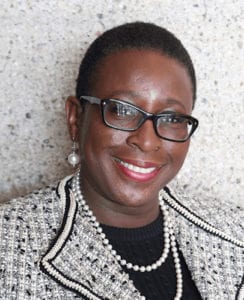Who is a member?
Our members are the local governments of Massachusetts and their elected and appointed leadership.

Mayor Yvonne Spicer
Framingham Mayor Yvonne Spicer, who has transcended racial and gender barriers throughout her career, will discuss how women leaders can promote diversity, equity and inclusion during the 2021 Women Elected Municipal Officials Leadership Symposium, which will be part of the MMA Annual Meeting & Trade Show.
Spicer will lead a discussion and question-and-answer session on Jan. 21 starting at 3 p.m., during the Annual Meeting’s only ticketed event. She will reflect on her unconventional political path, her experiences as a woman of color, lessons she has learned as a science educator, Framingham’s efforts to become a more equitable and inclusive city, and what women leaders can do to advance racial justice in their own communities.
“I look at ways in which I inspire other women, particularly young women, and that’s something that I don’t take lightly,” Spicer told the MMA in a recent interview. “I have not only the responsibility of doing my very best in this job, but I also carry generations with me on my shoulders. I carry women and women of color.”
Spicer has broken ground in both education and government. At the State University of New York in Oswego, she was the only woman of color in her technology education program. She became Framingham’s first mayor in 2018, after the town switched to a city form of government. And she is the state’s first African-American woman to be popularly elected as mayor.
A native of Brooklyn, New York, Spicer holds a bachelor’s degree in industrial arts and technology and a master’s degree in technology education, both from SUNY Oswego, and a doctorate in educational leadership from UMass Boston. She spent 16 years working for the Framingham public schools as a science and technology teacher and as an administrator, and then as a school administrator in Newton. In 2007, she began a decade-long tenure as vice president for advocacy and educational partnerships at the Museum of Science.
In 2010, former Gov. Deval Patrick appointed Spicer to the Massachusetts STEM Advisory Council, and Gov. Charlie Baker reappointed her in 2017. She has served as an advisor to the National Governors Association and as president of the International Technology and Engineering Educators Association. With a focus on economic issues, Spicer has also served on the Massachusetts Business Roundtable and the state’s Economic Empowerment Trust Fund.
“I bring so many different lenses to this work, and I’m actually quite grateful for that,” Spicer said.
She was recently recognized with one of five Women of Courage and Conviction Awards given by the Greater Boston Section of the National Council of Negro Women.
Spicer has lived in Framingham for 35 years and, before becoming mayor, she had served as a Town Meeting member and as a member of the Standing Committee on Ways and Means and the Framingham Human Relations Commission.
As mayor, Spicer said she derives energy from networking with other city leaders, ranging from the state’s dozen or so women mayors to big-city leaders across the country, including prominent mayors of color, such as Atlanta Mayor Keisha Lance Bottoms, Washington, D.C., Mayor Muriel Bowser and New Orleans Mayor LaToya Cantrell.
“We are all trying to do the same thing, which is run our cities in a way that is honoring who we are as women, and as women of color, but also against adversity,” Spicer said. “And sometimes, there’s quite a bit of adversity.”
Though people of color make up more than 30% of Framingham’s population, Spicer said, the municipal government’s workforce was 91% white when she arrived. She has since required officials to document efforts to attract and retain diverse candidates with each hiring request. She has also gotten City Council approval to fund a diversity, equity and inclusion officer, and the city is now advertising for that senior-level position.
Spicer has signed an executive order with her Health Department to declare racism a public health crisis, and signed a similar resolution with many other mayors across the state.
“If we’re going to make systemic and sustainable change, then we really need to be consciously focused on strategies that we’re doing to hire new people, things that we’re doing within purchasing and all of the practices that we have,” Spicer said.